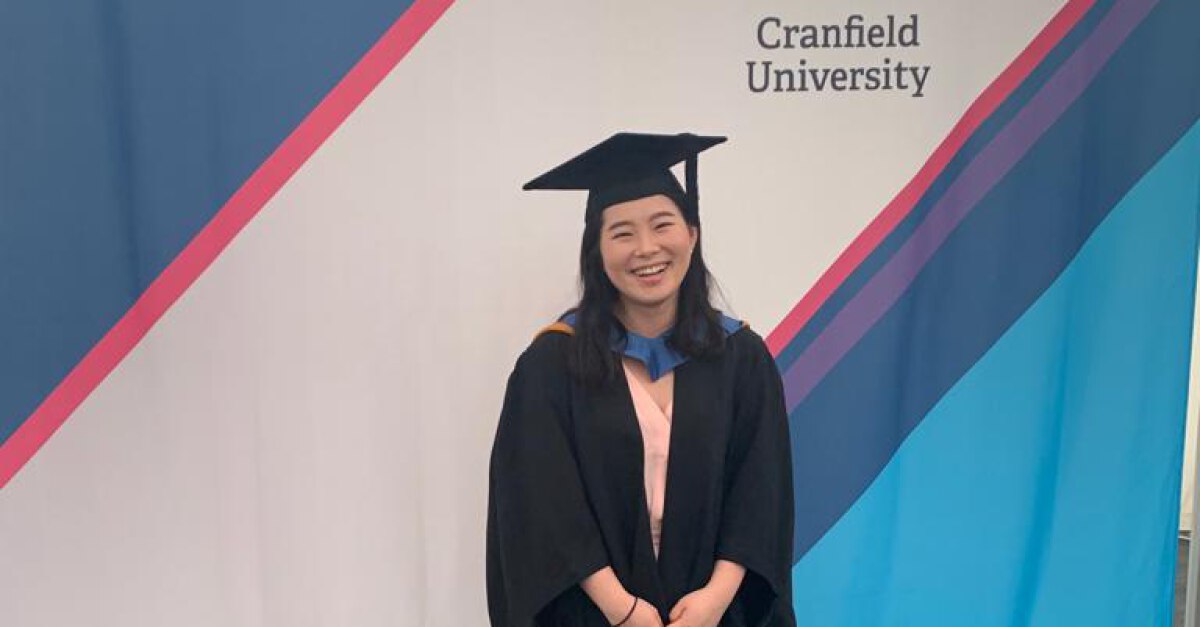How Cranfield is creating solutions for a greener future
21/09/2023

Cranfield University is putting immense effort into creating solutions for a greener future by giving more attention to research in areas such as hydrogen generation. Collaborating on this research with key players in industry could benefit both the University and international industries.
Saerom Jang is a PhD student who, after completing an Aerospace Materials MSc, wanted to expand her knowledge and became highly interested in catalysts. Catalysts have the potential to improve sustainability in a number of ways, such as by lowering emissions of greenhouse gases and by producing renewable energy. Therefore, she chose to carry out research in this area to learn more about sustainable material solutions that can contribute to a greener future.
Why did you choose to study at Cranfield?
“Choosing Cranfield University for the PhD wasn’t difficult because I knew that I was in good hands! During the COVID-19 pandemic, my lecturers and supervisors were very supportive and encouraging, and I really appreciated their guidance despite all the difficulties during the pandemic. Having a funded PhD offered by a sponsor was only possible because of my supervisors now, and I really appreciate their huge effort to make this happen and I feel very lucky to have such amazing supervisors always giving me support.
“When looking for a university to earn my MSc, I prioritised two criteria:
(1) A significant emphasis on aeronautical and material science, and (2) a strong connection to industry, so that she could acquire the skills she would need for her future profession.”
With a background in aerospace engineering, Saerom knew that the materials used in aerospace systems may make a significant difference in how well they function, how efficiently they use fuel, and how safely they operate. If she were to major in materials science, she could help pave the way for the creation of materials with far-reaching effects on our planet, our culture, and our future.
With an emphasis on materials science and close ties to major aerospace industry leaders like Airbus and Rolls-Royce, Cranfield University was an ideal fit for Saerom. Our extensive lecture modules covered everything from the basics to her favourite topic, functional materials.
Saerom’s research focuses on next-generation beyond-lithium batteries using less critical materials, and more sustainable and abundant materials.
What does a typical day look like for you?
“I begin each day by checking on experiments that have been running overnight. I double-check experiment settings, assess data collected overnight, and organise my day’s experiment based on that data. If my batteries fail, I will replace them with new sample batteries, followed by a brief lunch break with my colleagues. Following that, I would conduct experiments or characterisation sessions that I had previously planned – depending on what my experiment required, I would make more battery materials or characterise materials or batteries. And then I’ll take a quick coffee break with my lab buddies before returning to the lab for further experiments. Close to the end of the day, I will prepare for the next day and put memos around my workbench because I am a forgetful person. And with that, the day is done!”
In her spare time, Saerom loves to sew! She first started to shorten pairs of jeans because UK’s women’s clothes are too big for her. But she started enjoying it more and more.
What would be your one piece of advice to anyone thinking about joining Cranfield?
“I would like to ask people (just in general) to join us to create a greener future! We (researchers) think seriously about sustainability, not only the materials but also sustainability in sourcing and making materials, assembling, and even the end-of-life. I would love to see more and more people thinking about sustainability for the future generation.”
Find out more about our research opportunities.
Categories & Tags:
Leave a comment on this post:
You might also like…
From classroom to cockpit: What’s next after Cranfield
The Air Transport Management MSc isn’t just about learning theory — it’s about preparing for a career in the aviation industry. Adit shares his dream job, insights from classmates, and advice for prospective students. ...
Setting up a shared group folder in a reference manager
Many of our students are now busy working on their group projects. One easy way to share references amongst a group is to set up group folders in a reference manager like Mendeley or Zotero. ...
Company codes – CUSIP, SEDOL, ISIN…. What do they mean and how can you use them in our Library resources?
As you use our many finance resources, you will probably notice unique company identifiers which may be codes or symbols. It is worth spending some time getting to know what these are and which resources ...
Supporting careers in defence through specialist education
As a materials engineer by background, I have always been drawn to fields where technical expertise directly shapes real‑world outcomes. Few sectors exemplify this better than defence. Engineering careers in defence sit at the ...
What being a woman in STEM means to me
STEM is both a way of thinking and a practical toolkit. It sharpens reasoning and equips us to turn ideas into solutions with measurable impact. For me, STEM has never been only about acquiring ...
A woman’s experience in environmental science within defence
When I stepped into the gates of the Defence Academy it was the 30th September 2019. I did not know at the time that this would be the beginning of a long journey as ...







